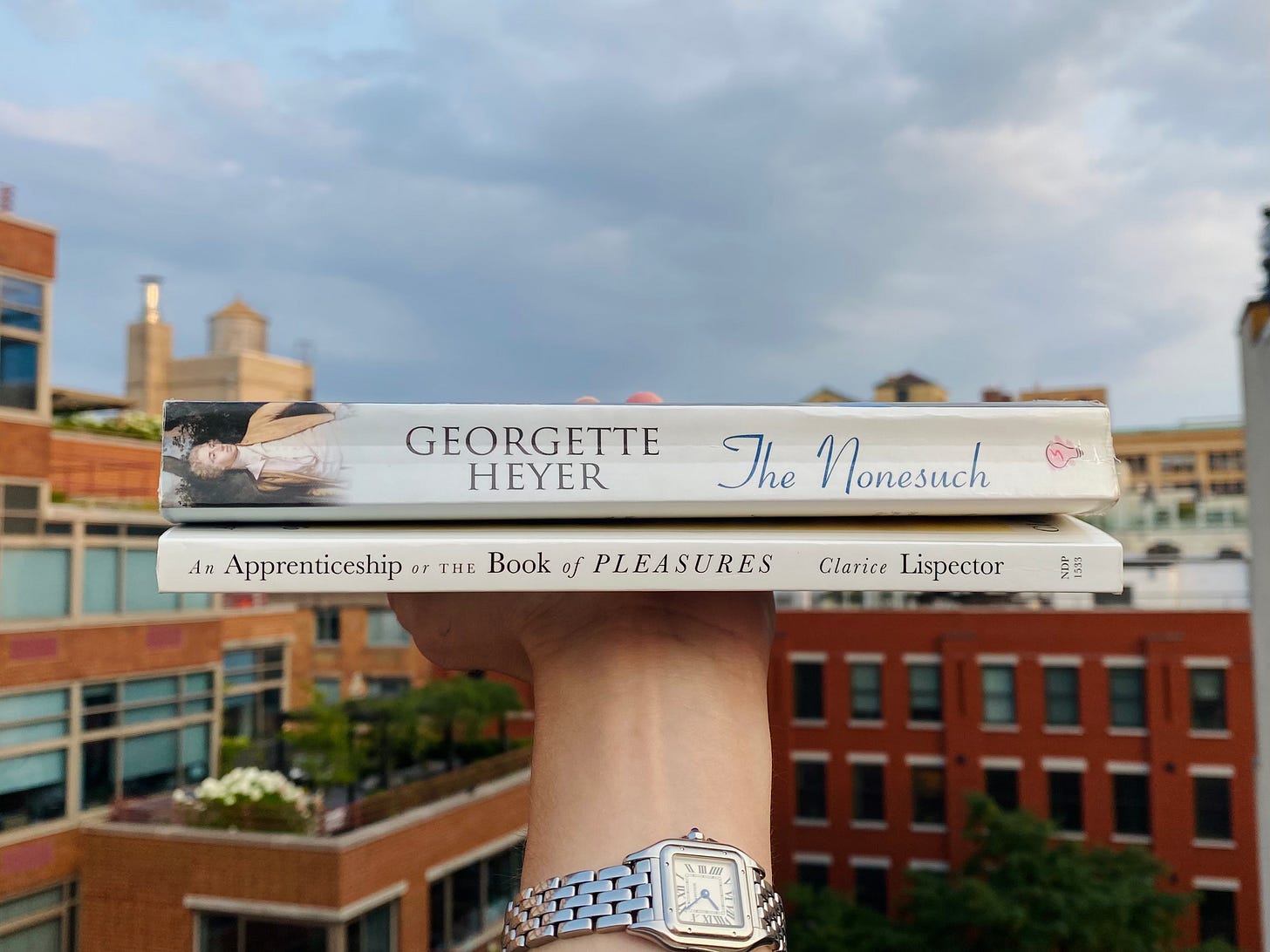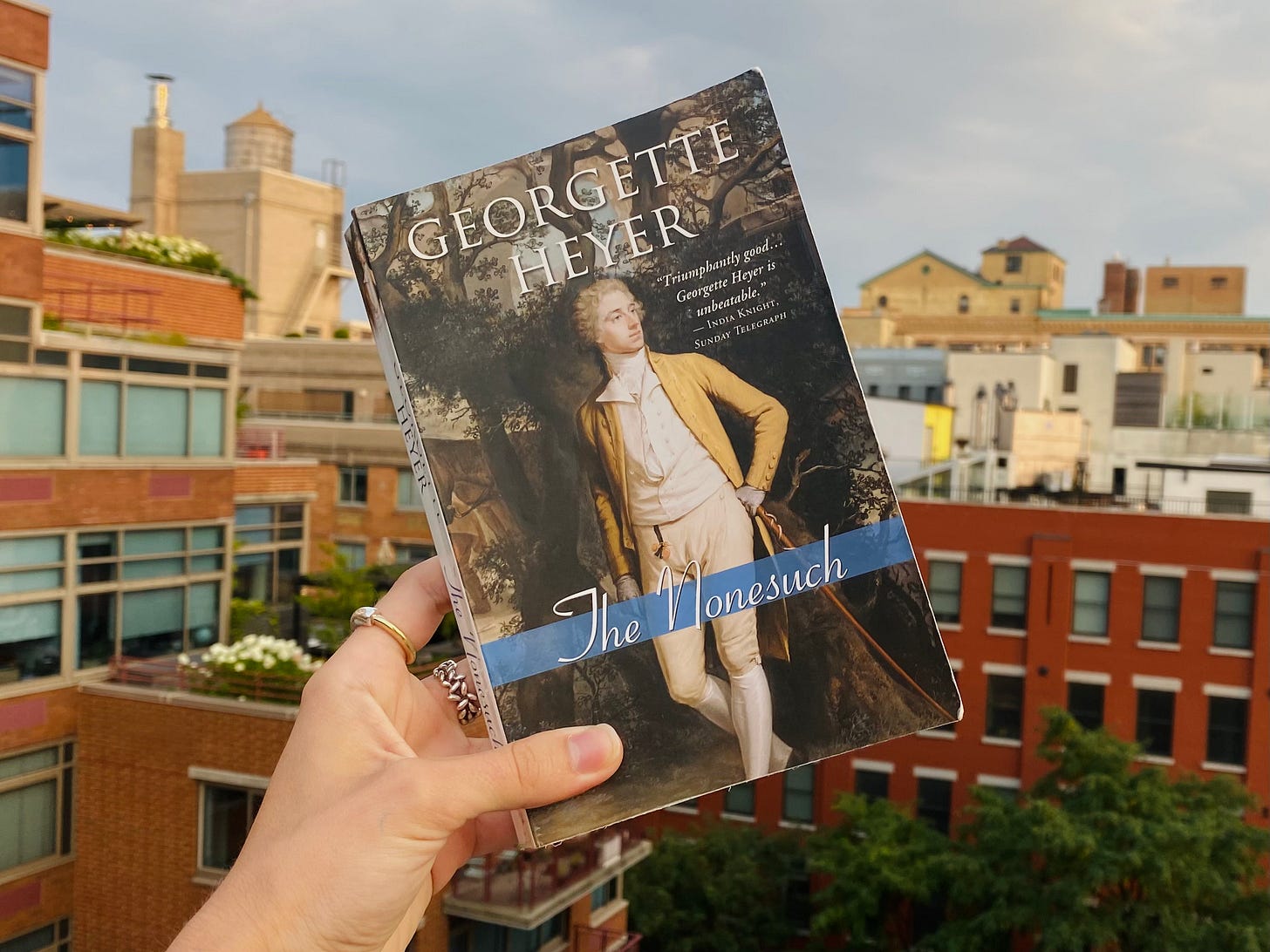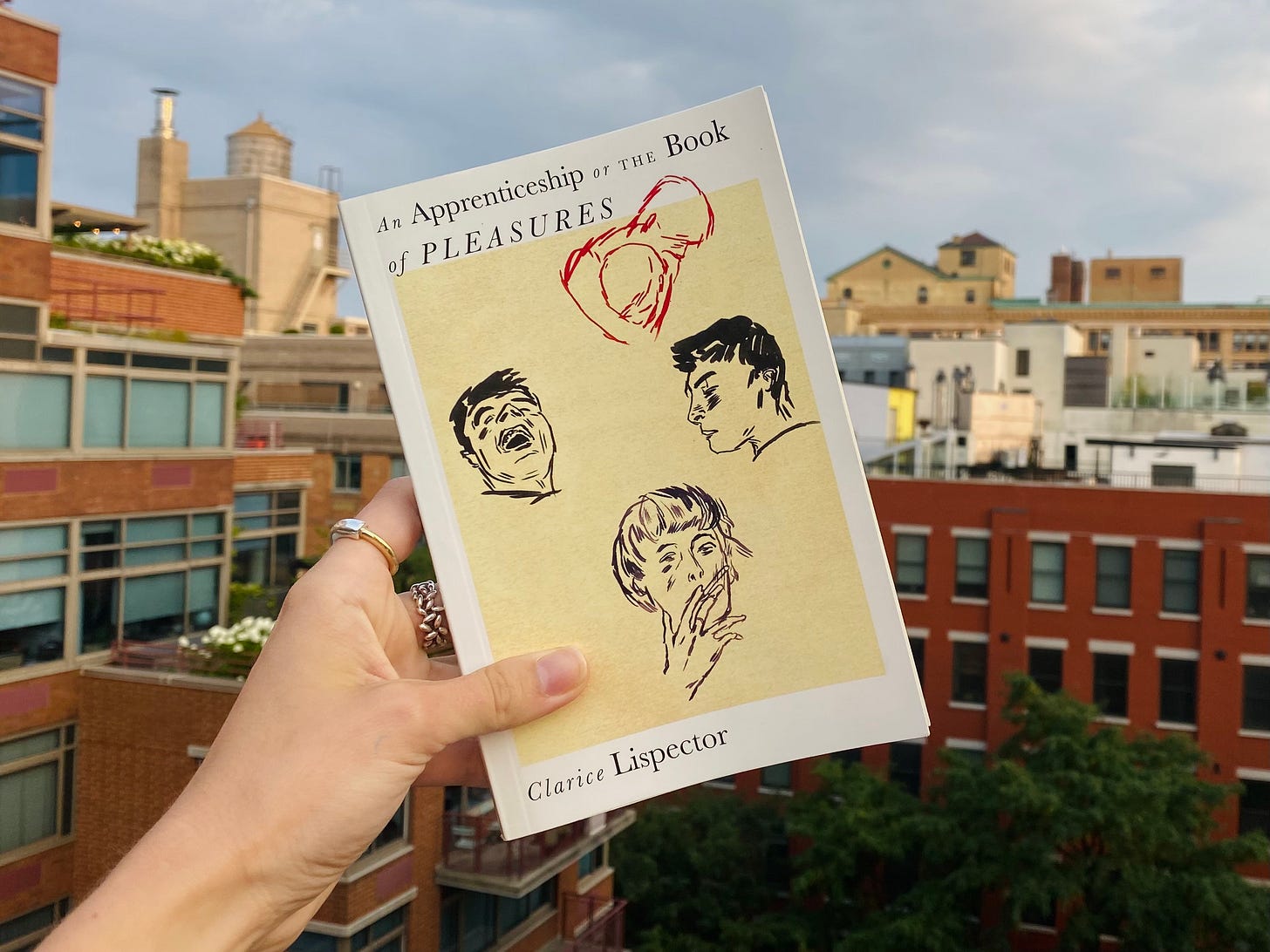Last Month's Reads
These are the books I read in July :)
You guys! This week is such a good week!! The weather is SPECTACULAR. Even though I think it’s actually supposed to rain today (time of posting), it has been the most glorious day today (time of writing). Today’s books are extremely different, but both extremely good. You really can’t go wrong—I am pleased to say that July was a preposterously good reading month.
I get immense satisfaction from perfectly balancing my reading material. Not too much of the same thing, while still maintaining some level of cohesion. It occurs to me that I haven’t talked about this before, but now it feels right to share a little bit here about how I achieve—or at least try to achieve—that beautiful balance. I never choose what book I’m reading next until I finish the one on hand. I recently discovered that this is called mood reading. I never knew it had a name because I never thought about reading any other way. It’s just not possible for me to know what I will be yearning for ahead of time. I cannot constrain myself. Even when I go on vacation I bring double the number of books I might read, and sometimes I might even leave them all sitting in my bag and go buy a book instead. That’s just my way.
The best part about this approach, in my opinion, is looking back after the fact and realizing that my reading wasn’t random at all. Without fail, there are always threads of connection that I can trace two, three, four books back. This July, I read love stories. I read about loving yourself, loving each other, loving true loves. Falling in love, losing love, learning to love. Love love love! You can read my review of The Mill on the Floss here, and without further ado, my other two July reads right down below :)
The Nonesuch by Georgette Heyer
Like the mood reader I apparently am, after finishing The Mill on the Floss, I felt a bit lost. Where to turn after a novel that struck me so powerfully, straight in the gut? My emotions were frayed, and Eliot’s words still danced through my head. I realized that my inner voice had taken on a strange Victorian lilt. Knowing that I needed some rollicking fun but desirous of avoiding a cold plunge back into modernity, there was only one place to turn: my dearest, darling, lively, weaver of all literary delight, Georgette Heyer.
I picked up The Nonesuch and prepared to be transported, to laugh, and squeal, and blush—but like the way that one hand hold in the Kiera Knightley adaptation of Pride and Prejudice makes you blush. Chastely. I was not disappointed on any of the above counts. I’ve said it before, and I’ll say it again: Georgette Heyer does not miss. Her characters come to life so effortlessly, and before you even realize you’re watching her paint a portrait, it stands completed before you ready to jump off the page (canvas? I lost track of my metaphor again).
The Nonesuch opens on dashing Sir Waldo Hawkridge sharing with his rather dismayed extended family that he is, in fact, the sole heir to their distant uncle’s fortune. That fortune includes dilapidated Broom Hall in the provincial village of Oversett. What on earth could Sir Waldo, society prince, possibly care for in a sleepy country town? Well…
He arrives at Broom Hall with Lord Julian Lindeth, his younger and much-admiring cousin, and it isn’t long until they’ve acquainted themselves with all of the respectable houses in the surrounding area. One house in particular, headed up by the widow, Mrs. Underhill, has a particularly beautiful niece staying within its walls. Miss Tiffany Wield is that beautiful girl, and she’s an heiress to boot! Young Lindeth is immediately infatuated with this tempestuous “diamond of the first water,” but Waldo finds the self-possessed woman serving as Tiffany’s governess much more intriguing. Miss Ancilla Trent is on the shelf at twenty-eight (duh), but is it really too late for love?
It’s good, clean, reliable fun, but of course, I’m not terribly difficult to please in this category. I am positively tickled by regency romance. If I believed in calling anything a “guilty pleasure,” this would be mine. If successfully executed, the historical setting helps to smooth out some of the wrinkles that can arise in the romance genre. I’m simply less likely to notice when things feel…predictable or trope-y if I’m focused on calling cards, and petticoats, and chaperones, and morning visits.
Georgette Heyer takes it all to the next level though. Linguistically and stylistically, her novels read like they were written by a regency era author. I will even risk incurring the rancor of Austenites by suggesting that Heyer’s writing sits significantly closer to dear Jane’s than it does to any other modern romance writer I’m aware of. Aside from her skillful literary emulation, she achieves this effect through meticulous research. She does not let any of the details fall by the wayside. I know more about different kinds of horse drawn carriages than I ever thought possible. Not to mention the ways in which a cravat can be tied and folded. And the slang too! I know it all.
Most importantly, though the scrapes her characters end up in are outlandish and anachronistic, she makes more of an effort to fully acknowledge the societal mores of the day. When one of her characters is on the verge of becoming a “fallen woman,” you at least kind of believe that there could be legitimate consequences.
As fun as it is when the hero walks into the ladies’ powder room at just the moment that our heroine rips of her décolletage and reveals her heaving bosom, it does clash with the historical setting just a bit. The result of that clashing is that when the author later tries to introduce some “insurmountable,” I end up screaming at my book—“IF THEY COULD HOOK UP IN THE POWDER ROOM, WHY CAN’T HE MARRY HER EVEN THOUGH HE’S AFRAID OF DYING FROM A BEE STING AND WHY CAN’T SHE JUST BE WITH HIM EVEN THOUGH SHE DOESN’T HAVE A DOWERY, HE’S RICH ANYWAY!” You know??
Heyer’s commitment to historical accuracy along with her masterful manipulation of language and style result in less disparity between what is possible and what is not—and as a result, less me screaming at my book. Just as much squealing, but less screaming. The pretenses that keep Heyer’s lovebirds apart are more believable. Plus the total lack of sex—the most you’ll get out of her is a smooch at the end—means delightful, page tearing anticipation the whole way through. Each glance, wink, smile and brush of the hands packs a most satisfying punch.
Honorable mention for the fact that Heyer refers to gossip as “scandal-broth” on page 209. Why are we calling gossip tea when we could call it scandal-broth??? Let’s do better.
An Apprenticeship or The Book of Pleasures by Clarice Lispector
On a very different note, the second book I have to share with you today is one of the best I’ve ever read. I don’t know how I’m going to do this or write this. An Apprenticeship or The Book of Pleasures ROCKED me, both in the sense that it cradled me gently like a baby, and the sense that it roundhouse-kicked me in the face. I loved it so much. It should be required reading for every woman on the planet. How had I never heard of Claire Lispector? How had I never heard of this book?!
Well, for one, it was originally published in Portuguese in 1969. On top of that, it wasn’t translated into English until 52 years later. Injustice! As ever, I profoundly enjoyed the reading-in-translation experience. Words sound and taste different when they’re filtered through another language, it’s as simple as that. My edition, translated by Stefan Tobler, included opening epigraphs, a moving note from Lispector, the novel itself, and an afterword written by Sheila Heti. Every word was perfect. The cover is also perfect, which despite what they’ll try to tell you, is important after all.
This is the story of Lóri, who does not know how to live and therefore, does not know how to love. She teaches children at an elementary school. One day, she meets Ulisses on the street. He teaches philosophy at a university. Lóri is waging an epic battle against her own nervousness, loneliness, and fear of pain. She cannot be with Ulisses until she makes the necessary progress. We don’t really know quite what goes on inside his head, but we know that he will not have her in any way, including physically, until she has made the necessary progress. Progress in what? Learning how to become a human being. What follows is the most insane story of love I’ve ever read. It is profoundly affirming and earth shaking at the same time.
I realize that I’m not giving a normal summary, but there’s no way to normally summarize this book. It’s cartwheeling through my mind. I want to pick it up and start it again, but I won’t until I have a day when I can read the whole thing in one sitting. That’s the kind of book it is. Not least because it is rather disorienting. Certainly at first, when you’re still getting your footing, but even more so as the novel goes on, though in increasingly subtle and familiar ways. What do I want to tell you?
The first word isn’t a word, it’s a comma. There is barely any punctuation for the first ten pages. After that there was either more punctuation, or I stopped noticing that there wasn’t. At first, you will have no idea what is going on, or at least I didn’t. Stick with it. In the same way that other people’s anxieties can feel nonsensical in real life, the obstacles Lóri faces don’t make any sense at first. Very much unlike anything in real life, Lóri and Ulisses speak to each other in a way that no real pair of humans would ever speak. They say things that would never come out of a normal person’s mouth, but you’ll get used to it. They will become philosophers, but not in an intimidating way. They become, or they are, amateur philosophers.
That is what’s so powerful about Lispector’s writing. It is lofty and ambitious while remaining mundane and recognizable. Lóri makes coffee and thinks about how rain doesn’t feel gratitude or ingratitude, it just is. She isn’t sure how to pray, she doesn’t understand life, and she doesn’t know who she is. We as the reader are given a window into the deepest part of her mind, the part that a real person might not even have access to in themselves.
As I mentioned, the premise of the book, if it wasn’t clear enough, is that Ulisses demands a radical change in Lóri before they can be together. I wasn’t being metaphorical about that or interpreting. It’s literally the plot. I know it sounds questionable, but it’s not. Ulisses is right, Lóri needs a radical change. From the inside out, Lispector allows us to witness the transformation that must take place in a woman before she can love a man. Ulisses is simply the finger that pushes the first domino. The motivator of change doesn’t have to be a man, but the work of the transformation is very painful and very hard, so, something needs to be the motivator. The transformation, as I said, is that of becoming a human being. One must be fully a human being before they can love and be loved in peace.
You just have to read this book! I don’t know what else to say, Lóri swims in the sea in the early morning and she takes one bite out of a perfect red apple. She figures out how to pray. This review is probably more confusing than it is informing, but I hope my fluttering mania has been enough to convince you to read this book. Read it! Here is a seriously whittled down selection of my favorite quotes to hopefully entice you just a little bit more.
“He was a man, she was a woman, and a miracle more extraordinary than this could only be compared to the falling star that crosses the black sky almost imaginarily and leaves as its trail the vivid amazement of a living universe. He was a man and she was a woman.”
“‘There is a being who lives inside me as if it were his house, and it is. It’s a black and shiny horse that despite being completely wild—for it never lived in anyone before nor has anyone ever bridled and saddled it—despite being completely wild it has for precisely that reason the primal sweetness of someone who is not afraid: sometimes it eats from my hand.’”
“Lóri’s courage is that, not knowing herself, she still presses on, and acting without knowing yourself demands courage.”
“A few nights later she was sleeping. And though it sounds like a contradiction, softly all of a sudden the pleasure of being asleep had awoken her with a gentle start.”





I have had the mill on the floss in my ‘to read’ list for over a year now. How urgently do you think I should I tackle it?